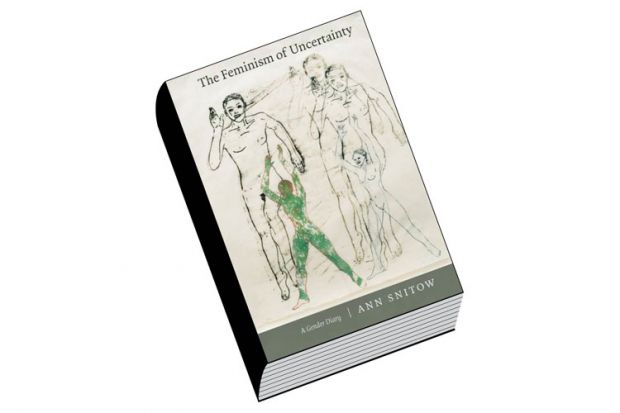This collection represents the best of 35 years’ worth of work by Ann Snitow, literary and gender studies scholar at the New School in New York. As she observes on her institutional web page, academia and activism are connected, in “imagining and reading about change, being sceptical about the meaning of particular social changes, being part of change”.
Change is a watchword here, both as a guiding structural principle of this collection and in the essays it contains. Over the years, Snitow’s attitudes and opinions have altered, as has the political landscape, but there are some constants: “Tone and context change, which is why I maintain my confidence in diaries, as reports from a particular time and place.” This anthology thus serves two purposes: it allows for a comparison of Snitow’s philosophies at different key points over the past four decades, and it brings her ideas to new readers.
The essays are bookended by two meditations, written in 2014, on what Snitow terms “the feminism of uncertainty”. These bookends themselves become palimpsests as “flashes of memory” cut across and inform the author’s voice, like Wordsworth’s “spots of time”. Snitow’s prose can be exquisite: “No activism is possible without naïveté, some faith in action in spite of rational assessments of what can actually be done”.
Although I’d have welcomed more of this reflective, recent voice, that’s not what this collection is about. Rather, it provides the opportunity to revisit Snitow’s game-changing writing. The 1989 essay “A gender diary” has not dated (a word Snitow herself dislikes). Its debate about “woman” as both construct and lived reality is as fresh as ever, and is framed in shifting and ultimately productive narrative movements between her own, immediate voice and, as the essay’s title suggests, diary extracts.
Snitow’s work has always been very readable. Her prose has that luminous fluency that comes only after a writer has been steeped in decades of rigorous reading, writing and activism. These essays repeatedly emphasise how important her students are to her. And what an inspiring teacher she must be, deeply aware as she is of the paradox of the feminist university professor: “She bites the hand that feeds her by critiquing the prevailing structures of knowledge, but she also knows she mustn’t bite too hard”.
For third- and fourth-wave feminist readers, The Feminism of Uncertainty will be both an introduction to Snitow’s philosophy and a valuable reminder not to reinvent the feminist wheel. In reflecting on her life’s work, she uses a nautical image: “Happy endings require that one set sail toward a near enough horizon and keep one’s eyes off the inevitable: failure, confusion, and the falling out of comrades”. And, as she might have added, the death of comrades, for while Snitow’s energy is undimmed, she must know that this book will be her intellectual legacy.
In 2007, she wrote a beautiful tribute (reproduced in this book) to Ellen Willis, the feminist rock music critic who had died a year earlier. As Snitow nears her own 73rd birthday, she cannot fail to be aware of the deeper, because closer-to-home, resonance of the words she wrote eight years ago about Willis. “The generation of U.S. women born in the 1940s and culturally shaped in the 1950s”, she mused, “who reacted violently against that culture by exploding into the civil rights, New Left, anti-war, and women’s movements of the 1960s, will soon be folded flat onto pages like this one.”
Willis, like Snitow, was one of the giants on whose shoulders today’s feminists stand, and, as we find our feet, The Feminism of Uncertainty does well to remind us of this.
Emma Rees is professor of literature and gender studies, University of Chester, and author of The Vagina: A Literary and Cultural History (2013).
The Feminism of Uncertainty: A Gender Diary
By Ann Snitow
Duke University Press, 378pp, £66.00 and £18.99
ISBN 9780822358602 and 8749
Published 11 September 2015
Register to continue
Why register?
- Registration is free and only takes a moment
- Once registered, you can read 3 articles a month
- Sign up for our newsletter
Subscribe
Or subscribe for unlimited access to:
- Unlimited access to news, views, insights & reviews
- Digital editions
- Digital access to THE’s university and college rankings analysis
Already registered or a current subscriber? Login




